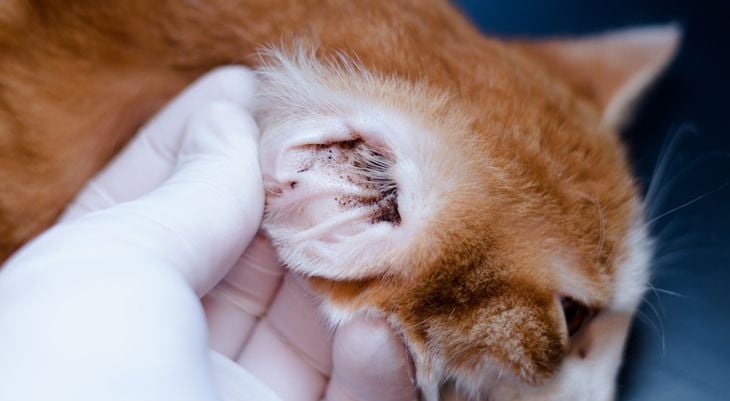
Most cats will never have a serious problem with their hearing during their lives. However, several ear issues can affect cats. Many of these can cause discomfort or pain, but some may even lead to a partial loss of hearing or deafness.
Ear issues in cats can have a variety of causes, including infections, trauma, conditions present at birth (congenital) or changes that occur with age. Most ear disorders in cats are easily treated, with no permanent damage to a cat’s hearing. Some conditions, though, can cause partial or total deafness, especially when they are not diagnosed promptly or left untreated.
Aural Hematoma
An aural hematoma is a swelling of the pinna—the fleshy, visible part of a cat’s outer ear. This structure is essential for hearing. Its job is to gather sound waves and direct them to the middle and inner ears.
Because the pinna is so exposed, it is easily injured. When the blood vessels inside the pinna are broken, the blood accumulates inside and causes the pinna to swell up like a balloon.
Injuries to the pinna can happen as a result of fights with cats or other animals. However, it is most often caused by a cat scratching too much at its own ears. This may be in response to an ear infection or ear mites.
An aural hematoma may heal on its own, but this will often take several weeks and cause the pinna to become deformed. The excess blood can be drained with a needle (aspiration), but surgery is a better long-term treatment. The cat will also need to be treated for underlying parasite infestations or infections.
Deafness
A variety of conditions can cause deafness in cats. Some cats may be born deaf or become deaf shortly after birth, as is the case with white cats with blue eyes. These conditions cannot be treated and the deafness is permanent.
Most cases of deafness in cats, though, occur later in life (acquired) as a result of a condition such as:
- Growths in the ear, both cancerous and non-cancerous
- Household chemicals that reach the middle or inner ear, either through a perforated ear drum or by the cat ingesting the chemical
- Thickening of the eardrum as a cat ages
The most common cause of deafness in cats, though, is an untreated infection of the outer ear (otitis externa) that passes into the middle or inner ear. This infection can be caused by bacteria, ear mites or yeast.
Acquired ear issues in cats are often treated with medicine, such as antibiotics for an infection. In some cases, however, surgery is the best option. Hearing loss can sometimes be slowed with proper treatment, but once a cat loses its hearing, the damage is permanent.
Keeping the cat’s environment clean will reduce the risk of an ear infection. You should also check your cat’s ears regularly for signs of infection and watch for excessive scratching at the ears. If you notice either of these, contact your feline veterinarian rather than trying to clean the ears on your own.
Ear Mites
Ear mites are a frequently diagnosed ear issue in cats. These tiny creatures crawl into the ear and start to breed, leading to an ear infection. If ear mites are not treated, the infection can spread to the middle and inner ear and cause hearing loss or balance problems.
Signs of an ear mite infestation include:
- Inflammation of the outer ear
- Flattening of the ear against the head
- Excessive scratching of the ear
- Shaking of the head
- Accumulation of wax and mite debris inside the ear canal
If you notice any of these symptoms, contact your veterinarian. If ear mites are present, the wax and debris will first need to be cleaned from the cat’s ears. A topical medication is then applied to the outer ear and ear canal. Ear mites easily pass from one cat to another, so you may need to have all of your cats checked or treated.
Otitis
Otitis externa is another commonly diagnosed ear issue in cats. This is an infection of the outer ear. It can lead to a buildup of earwax and damage to the tissues of the ear. If it is left untreated, the infection can spread to the middle or inner ear and cause loss of hearing—partial or total—or balance problems.
This condition has several causes, including:
- Ear mites
- Yeast infection
- Bacterial infection
If the infection migrates to the middle ear (otitis media) or inner ear (otitis interna), it can damage the sensitive structures of the inner ear, leading to a partial or complete loss of hearing. A cat’s balance may also be affected.
Otitis externa is easily treated by cleaning the outer ear and applying topical medications for the bacteria, yeast or ear mites. If the infection is severe enough, surgery may be required to remove the damaged tissues of the ear.
White Cats and Deafness
Deafness is a common hereditary problem in white cats, especially if they also have blue eyes. Hereditary conditions are ones that are passed from a parent to its offspring. This kind of deafness is permanent and has no treatment.
Between 17 and 22 percent of white cats without blue eyes are born deaf. The risk of going deaf increases if one or both eyes are blue. Up to 85 percent of white cats with two blue eyes are deaf.
The deafness may be present at birth or develop shortly afterwards. Sometimes these cats are only deaf in one ear. In those cases, the cat may be able to function normally.
Cats that are born completely deaf can also do well as companion animals. However, they should be kept indoors and care should be taken to avoid startling them.
To learn more about ear issues that affect cats, call our office today.
